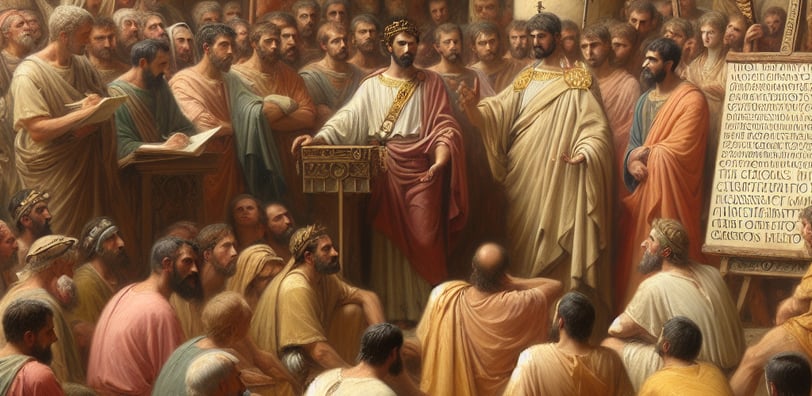Marcus Aurelius and the Persecution of Christians: A Historical Examination
Marcus Aurelius, known for his Stoic philosophy and just rule, presided over a period that saw persecution of Christians in the Roman Empire. This article examines the emperor's role in these events and the historical context surrounding them.
7/22/20242 min read


Historical Context
Christianity in the Roman Empire
Christianity was a relatively new and growing religion during Marcus Aurelius's reign (161-180 CE).
It was often viewed with suspicion by Roman authorities and the general population.
Roman Religious Policy
Romans generally practiced religious tolerance but expected participation in state cults.
Christians' refusal to worship Roman gods was seen as potentially destabilizing to the empire.
Persecution Under Marcus Aurelius
Extent of Persecution
Persecutions during this period were not empire-wide but localized and sporadic.
Notable incidents occurred in Smyrna (165 CE) and Lyon (177 CE).
The Martyrdom of Polycarp
Polycarp, Bishop of Smyrna, was executed in 165 CE.
This event is one of the most well-documented Christian martyrdoms of the period.
The Persecution in Lyon
In 177 CE, a significant persecution of Christians occurred in Lyon, Gaul.
Numerous Christians were tortured and executed, as recorded by Eusebius.
Marcus Aurelius's Direct Involvement
Lack of Clear Evidence
There's no direct evidence that Marcus Aurelius personally ordered these persecutions.
Some historians argue he may have been unaware of the extent of local actions against Christians.
Imperial Rescripts
Marcus did issue rescripts (legal responses) that could be used against Christians.
These were often in response to specific inquiries from provincial governors.
Factors Contributing to Persecution
Natural Disasters and Plagues
The empire faced numerous challenges during this period, including the Antonine Plague.
Christians were often scapegoated for these misfortunes.
Political Instability
Wars and rebellions led to a desire for unity, which Christians were seen as threatening.
Misunderstanding of Christian Practices
Roman misinterpretations of Christian rituals (e.g., the Eucharist) led to accusations of cannibalism and incest.
Marcus Aurelius's Philosophical Views
Stoic Philosophy
Marcus's Stoic beliefs emphasized duty to the state and traditional Roman virtues.
This may have influenced his view of Christianity as potentially subversive.
Mentions in "Meditations"
Marcus briefly mentions Christians in his personal writings, criticizing what he saw as their obstinacy in the face of death.
Historical Debate
Varying Interpretations
Some historians argue Marcus actively persecuted Christians.
Others suggest he merely allowed existing laws to be enforced more strictly.
Comparison with Other Emperors
Marcus's reign saw less systematic persecution than under emperors like Decius or Diocletian.
Legacy and Impact
Effect on Christian-Roman Relations
These persecutions contributed to the growing tension between the Roman state and Christianity.
Historical Memory
Later Christian writers often portrayed Marcus negatively, despite his reputation for wisdom in other areas.
Conclusion: A Complex Historical Picture
The relationship between Marcus Aurelius and the persecution of Christians remains a subject of historical debate. While persecutions did occur during his reign, the extent of his personal involvement and approval is unclear. This aspect of his rule highlights the complexities of governing a diverse empire and the challenges faced by minority religious groups in ancient Rome.
Understanding this period requires balancing Marcus Aurelius's reputation as a philosopher-king with the realities of Roman imperial policy and societal attitudes towards Christianity. It serves as a reminder that even revered historical figures operated within the constraints and prejudices of their time.
Waste no more time arguing about what a good man should be. Be one - Marcus Aurelius
We suffer more often in imagination than in reality - Seneca
Wealth consists not in having great possessions, but in having few wants - Epictetus
